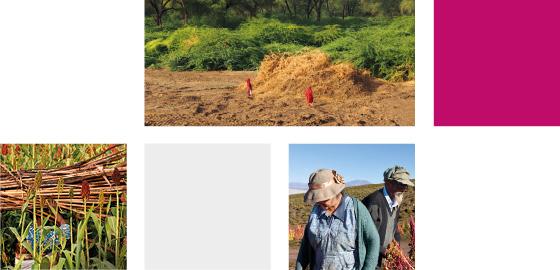Thematically Open Research
The thematically open research module funds high-quality research that contributes to the solution of global problems in least developed, low- and middle income countries. The topics in this module emerge bottom-up.
Portrait
The topics of the r4d projects in the thematically open research module are defined by the researchers and serve the overall aim of the r4d programme. Researchers employed at a Swiss research institution as well as researchers employed at a research institution in African, Asian and Latin American countries that belong to the category of least developed, low income or lower middle income countries ( DAC list published by the Organisation for Economic Co-operation and Development (OECD)) are eligible to receive funding. The participation of researchers from upper middle income countries is optional and must be justified with regard to the relevance of the country for the topic. The partnership projects have to be composed of, at least, one Swiss research group and one research group from a developing country (group 1).
In the thematically open research module each project has a running time of maximally 4 years and a total budget of about CHF 600’000.
Schedule
The 1st thematically Open Call was launched on 6 June 2012.
The 2nd thematically Open Call was launched on 8 October 2014.
The 3rd thematically Open Call was launched on 27 March 2017.
Review Panel
Review Panel Members:
- Marie-Louise Newell, University of South Hampton, United Kingdom (Panel President)
- Urs Baltensperger, Paul Scherrer Institute, Switzerland (National Research Council Delegate)
- Renaud Bequet, Université de Bordeaux, France
- Karen Coelho, Madras Institute of Development Studies, India
- Pierre-André Cordey, Policy and Analysis, SDC, Switzerland (SDC Delegate)
- Roger Jefferey, School of Social and Political Science, University of Edinburgh, United Kingdom
- Elizabeth Jimenez Zamora, Universidad Mayor de San Andrés, Bolivia
- Susan Parnell, University of Cape Town, South Africa
- Upadrasta Ramamurty, Department of Materials Engineering, Indian Institute of Science, India
- Edith Taleisnik, Universidad Católica de Córdoba, Argentina
Research Network
$(document).ready(function() {
/*
* Simple image gallery. Uses default settings
*/
$('.fancybox').fancybox();
/*
* Different effects
*/
// Change title type, overlay closing speed
$(".fancybox-effects-a").fancybox({
helpers: {
title : {
type : 'outside'
},
overlay : {
speedOut : 0
}
}
});
// Disable opening and closing animations, change title type
$(".fancybox-effects-b").fancybox({
openEffect : 'none',
closeEffect : 'none',
helpers : {
title : {
type : 'over'
}
}
});
// Set custom style, close if clicked, change title type and overlay color
$(".fancybox-effects-c").fancybox({
wrapCSS : 'fancybox-custom',
closeClick : true,
openEffect : 'none',
helpers : {
title : {
type : 'inside'
},
overlay : {
css : {
'background' : 'rgba(64,64,64,0.85)'
}
}
}
});
}); .fancybox-custom .fancybox-skin {
// box-shadow: 0 0 50px #222;
}
body {
max-width: 1356px;
margin: 0 auto;
}The first 11 r4d projects in the thematically open research module started in 2013. They represent transnational research partnerships between 12 countries and Switzerland, involving 51 grantees.
$(document).ready(function() {
/*
* Simple image gallery. Uses default settings
*/
$('.fancybox').fancybox();
/*
* Different effects
*/
// Change title type, overlay closing speed
$(".fancybox-effects-a").fancybox({
helpers: {
title : {
type : 'outside'
},
overlay : {
speedOut : 0
}
}
});
// Disable opening and closing animations, change title type
$(".fancybox-effects-b").fancybox({
openEffect : 'none',
closeEffect : 'none',
helpers : {
title : {
type : 'over'
}
}
});
// Set custom style, close if clicked, change title type and overlay color
$(".fancybox-effects-c").fancybox({
wrapCSS : 'fancybox-custom',
closeClick : true,
openEffect : 'none',
helpers : {
title : {
type : 'inside'
},
overlay : {
css : {
'background' : 'rgba(64,64,64,0.85)'
}
}
}
});
}); .fancybox-custom .fancybox-skin {
// box-shadow: 0 0 50px #222;
}
body {
max-width: 1356px;
margin: 0 auto;
}The second wave of 13 r4d projects in the thematically open research module started in 2016. They represent transnational research partnerships between 14 countries and Switzerland.
$(document).ready(function() {
/*
* Simple image gallery. Uses default settings
*/
$('.fancybox').fancybox();
/*
* Different effects
*/
// Change title type, overlay closing speed
$(".fancybox-effects-a").fancybox({
helpers: {
title : {
type : 'outside'
},
overlay : {
speedOut : 0
}
}
});
// Disable opening and closing animations, change title type
$(".fancybox-effects-b").fancybox({
openEffect : 'none',
closeEffect : 'none',
helpers : {
title : {
type : 'over'
}
}
});
// Set custom style, close if clicked, change title type and overlay color
$(".fancybox-effects-c").fancybox({
wrapCSS : 'fancybox-custom',
closeClick : true,
openEffect : 'none',
helpers : {
title : {
type : 'inside'
},
overlay : {
css : {
'background' : 'rgba(64,64,64,0.85)'
}
}
}
});
}); .fancybox-custom .fancybox-skin {
// box-shadow: 0 0 50px #222;
}
body {
max-width: 1356px;
margin: 0 auto;
}The third wave of 11 r4d projects in the thematically open research module were selected in May 2018. They represent transnational research partnerships between 18 countries and Switzerland, involving 55 principle investigators and their research groups.
Events
- Kick-off meeting, thematically Open Call 3, 9 October 2018
- r4d forum Open Call 1 and 2, 19 September 2017
- Kick-off meeting, thematically Open Call 1, March 2014
News

